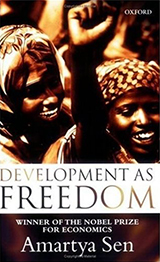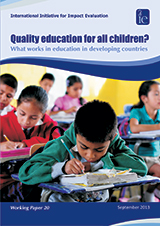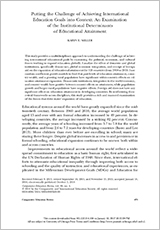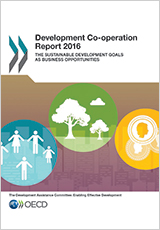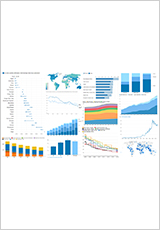국제교육개발
국제교육개발 (international development and education) heavily focuses on developing countries and examines issues such as the role of education in development, the work of international organizations (UNESCO, World Bank, OECD, etc.), international development cooperation, and educational issues salient in MDG and SDG (Millenium Development and Sustainable Development) goals set through international agendas such as gender inequality or quality education. This field is largely driven by practice and policy as developing countries are striving to provide quality education for all and equal educational opportunities for all children.
In the case of Korea, 국제교육개발 is particularly relevant because Korea has become an OECD DAC (Development Assistance Committee) member in 2009. The Korean government is thus now in the position of providing Official Development Assistance to other developing countries. ODA (개발원조) is officially defined as the transfer of not only resources but also skills and knowledge from more developed countries or international organizations to less developed countries with the purposes of fostering their development and eradicating poverty (OECD, 2016). Korea is the first country to have shifted from recipient to donor of ODA in a short amount of time. This is an achievement, but also a challenge. Ban Ki-moon, former UN secretary-General, stated at a business speech in August 2011: “Korea, as the lighthouse for the developing countries, is required to share the experience of democratization and economic development.” 국제교육개발 ultimately aims to improve the quality of education throughout the world and empower all children to reach their full potential.
Here are some examples of questions we ask:
- What is the role of education in development?How can we define development? Is Korea a developed or a developing country?
- What is the role of international organizations in education development?
- What types of education interventions are most effective to support education in Vietnam? In Malawi? In Sudan?
- How can we educate students in a refugee camp?
- How can we provide equal educational opportunities for girls in developing countries?
국제교육개발 영역은 교육과 개발의 쟁점들을 검토하고 관련 방안을 모색하는데, 이 분야에서는 주로 개발도상국 연구에 초점을 둔다. 개발에서의 교육의 역할, 국제기구의 업무(UNESCO, World Bank, OECD, 그 외), 국제개발협력, 질 높은 교육(quality education) 및 성불평등과 같은 국제적 안건으로 설정한 밀레니엄 개발 목표(Millenium Development Goals)와 지속가능한 개발 목표(Sustainable Development Goals)에서 중요하게 다루는 교육 문제와 같은 이슈들을 면밀히 검토한다. 국제협력을 통해 모든 아이들에게 평등한 교육기회와 질 높은 교육을 제공하기 위해 노력하는 가운데, 이 분야는 특히 교육 프로그램의 실행과 평가를 탐구하는 정책과 실천에 기반을 둔다.
한국의 경우, 2009년에 OECD의 개발원조위원회(Development Assistance Committee)의 회원국이 되면서 국제교육개발과 더욱 밀접한 관련을 맺게 되었다. 또한, 현재는 선진국으로서 다른 개발도상국에 공적개발원조(Official Development Assistance)를 제공하는 입장으로 바뀌었다. 공적개발원조는 빈곤퇴치와 개발을 목적으로 선진국이나 국제기구에서 저개발국가로 자원뿐만 아니라 기술이나 지식을 이전하는 것을 의미한다. 한국은 최초로 가장 짧은 시간 내 개발원조의 대상에서 주체로 역할의 전환을 경험한 국가이다. 이는 큰 성과인 동시에, 첫 수원국-공여국 전환국가로서 개발도상국에게 원조를 제공해야 하는 중책이기도 하다. 반기문 전 유엔사무총장은 2011년 8월 대한상공회의소에서 기업인들을 대상으로 한 조찬강연회에서 “한국은 많은 개도국에 희망의 등대가 되고 있으며, 이들에게 특별한 동반자가 돼야 한다”고 하였다. 국제교육개발 분야는 궁극적으로 전 세계의 교육의 질을 향상시키고 모든 아이들이 자신의 잠재력을 최대한 발휘할 수 있도록 하는 것을 목표로 한다.
- 개발에 있어 교육의 역할과 의제는 무엇인가?
- 개발을 어떻게 정의할 수 있을까? 한국을 선진국 또는 개발도상국으로 분류할 수 있는 기준은 무엇인가?
- 교육개발에 있어 국제기구의 역할은 무엇인가?
- 베트남, 말라위, 수단 등 개발도상국에서는 어떤 종류의 교육 개입이 가장 효과적인가?
- 난민 캠프에서 학생들에게 어떠한 교육을 할 수 있을까?
- 어떻게 하면 개발 도상국의 여자아이들에게 동등한 교육의 기회를 제공할 수 있을까?
Readings & Resources
Quality education for all children? What works in education in developing countries
Krishnaratne, Shari, Howard White, and Ella Carpenter | 2013
Putting the Challenge of Achieving International Education Goals into Context: An Examination of the Institutional Determinants of Educational Attainment
Karyn E. Miller | 2016
Development Co-operation Report 2016 - The Sustainable Development Goals as Business Opportunities
OECD | 2016
Quality education for all children? What works in education in developing countries
Krishnaratne, Shari, Howard White, and Ella Carpenter | 2013
Putting the Challenge of Achieving International Education Goals into Context: An Examination of the Institutional Determinants of Educational Attainment
Karyn E. Miller | 2016
Development Co-operation Report 2016 - The Sustainable Development Goals as Business Opportunities
OECD | 2016
